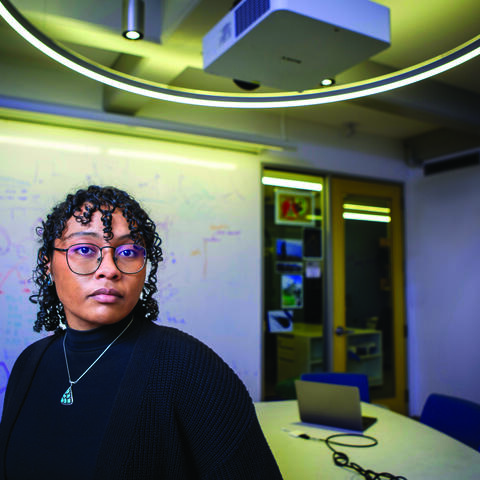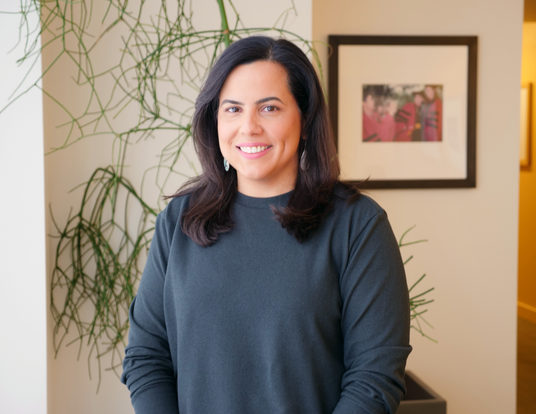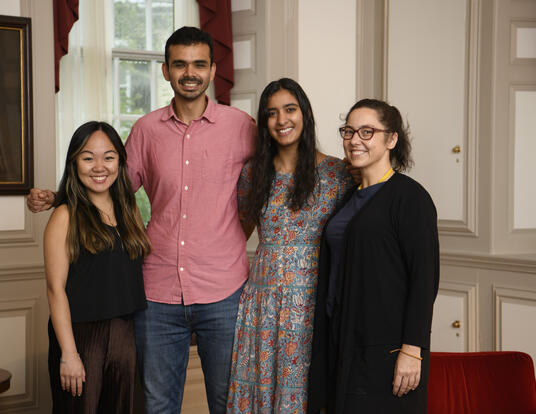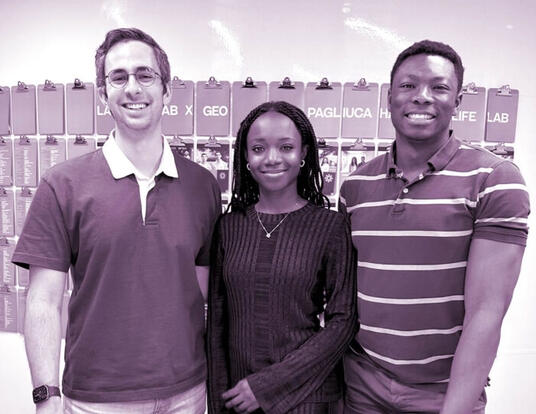Emboldening Student Voices
Alyssa Hernandez and Freddy Valencia named first diversity and inclusion fellows.
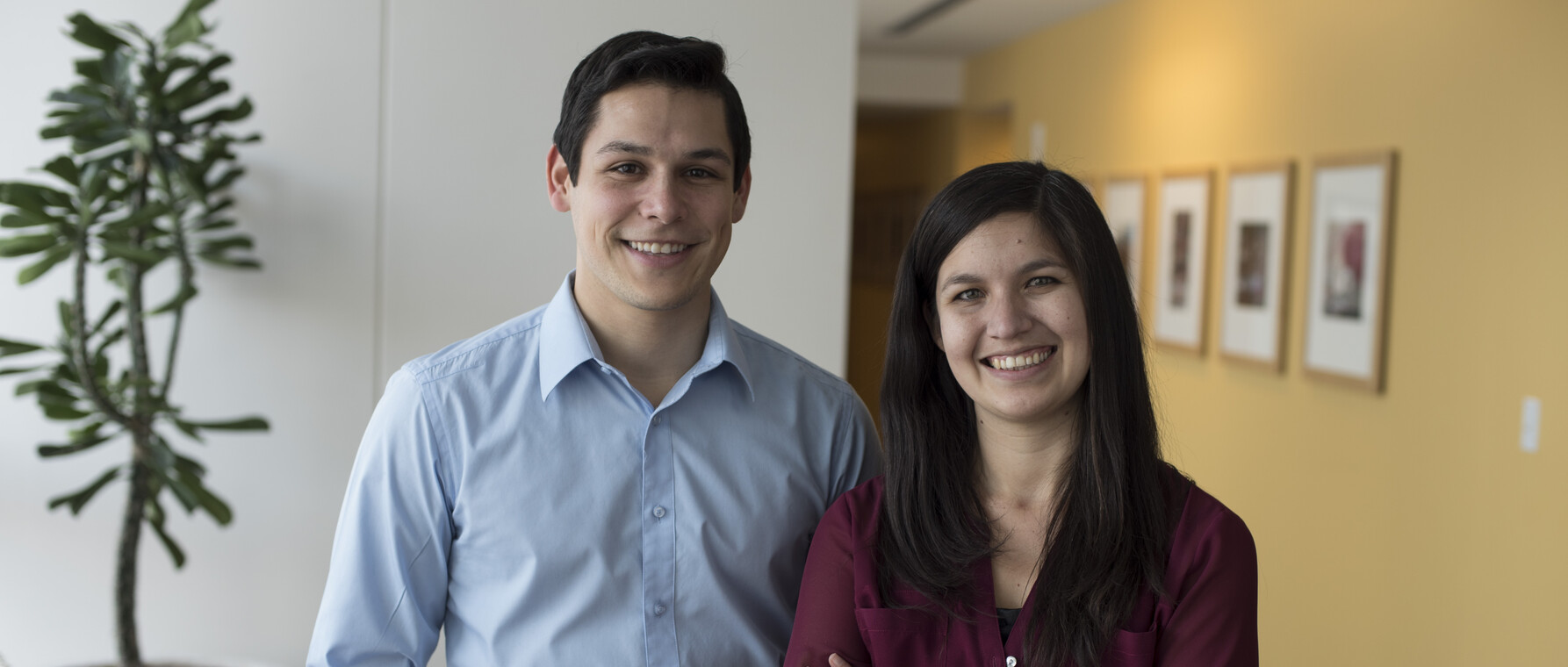
Getting an acceptance letter from Harvard University brings with it a rush of joy, excitement, and sometimes more than a little bit of anxiety. For Freddy Valencia, a PhD student in chemical biology, the rigors of Harvard’s academics weren’t as intimidating as the sense that he might not fit in.
“In deciding to come to Harvard, I had this feeling that I would have to fit the ‘Harvard mold,” he says. Valencia was concerned that as a Latino—and a first-generation college student—he wouldn’t be able to connect with faculty and fellow students. Alyssa Hernandez, a PhD student in the Department of Organismic and Evolutionary Biology, had the same fears, until she found, via GSAS student groups, peers at Harvard who offered her a chance to talk about her own experiences as an LGBT woman of color in the sciences. “You need someplace to go talk to people about what you’re experiencing, and you need a safe place to do that,” she says.
Valencia and Hernandez are the inaugural diversity and inclusion fellows in the GSAS Office of Diversity and Minority Affairs. These yearlong, paid positions are designed to improve communication between students and administrators at GSAS.
An Unvarnished View
Dean for Academic Programs and Diversity Sheila Thomas says that this role is crucial in helping administrators provide better support to students. While the Office of Diversity and Minority Affairs meets with student groups to hear their concerns about academic and student life, Thomas hopes Hernandez and Valencia will provide unvarnished views of the student experience.
“If I go out to students as an administrator and say ‘tell me your thoughts,’ I’m not going to hear the same things that a student will hear,” says Thomas. “The fellows provide an additional perspective.”
Hernandez and Valencia’s first order of business will be to listen to students and learn what is most important to them. They come into their roles with an awareness that every minority, female, or LGBTQ student's experience is unique.
“We may not represent every background here at Harvard, but one of the things that we can do is show that we are here to listen,” says Hernandez.
Valencia does see common threads that connect students of color. He says that many students feel like imposters when they first come to Harvard, but it's a topic that is rarely discussed out in the open.
“Studies show that first-generation college students, students of color, and underrepresented students generally face higher anxiety and depression when pursuing higher education,” says Valencia. “I was fortunate enough to find affinity groups, specifically the W. E. B. Du Bois Graduate Society, in which I was able to discuss the issues I was facing.”
Student Leaders
Thomas says that Valencia and Hernandez were selected as fellows because they have distinguished themselves as leaders in the graduate student community.
Hernandez is a graduate mentor for the Harvard College Women’s Center Women in STEM program, a member of Harvard Graduate Women in Science and Engineering, and a participant in the Society for the Advancement of Chicanos/Hispanics and Native Americans in Science (SACNAS).
Valencia is co-president of Minority Biomedical Scientists at Harvard, a SACNAS participant, and a member of the W. E. B. Du Bois Graduate Society.
Student groups will play a large role in Hernandez and Valencia’s first few months on the job. Together, the fellows hope to strengthen student affinity groups at GSAS. “Student groups were so helpful in my first couple of years here, I just want to make what they do known to the graduate population,” says Hernandez.
The pair plan to meet with student group leaders across GSAS and work on ways to connect groups with common interests and with resources at Harvard. Future projects include investigating how different programs of study talk about diversity in their departments and participating in conversations around standardized testing in graduate admissions. In everything Hernandez and Valencia do, they’re bringing student voices to the table.
By increasing the number of students from underserved and underrepresented backgrounds, we embolden and increase the diversity of thoughts and ideas that are at Harvard.”
- Alfredo "Freddy" Valencia
Thomas also sees the diversity and inclusion fellowships as an opportunity for graduate students to develop leadership skills that will be beneficial in their careers inside or outside of academia. Because she plays a dual role as a member of the faculty and an administrator, Thomas hopes that the fellowships will help students gain a stronger sense of how they can use their skills as leaders and critical thinkers to have an impact on Harvard.
“Each group has a role to play in making Harvard a better and more inclusive place,” says Thomas. “Faculty have a role to play. Administrators have a role to play. Students have a role to play. We have to include all voices in the conversation.”
For Valencia, it all comes back to creating a sense of belonging at Harvard—one that isn’t based on fitting into a “Harvard mold.”
“By increasing the number of students from underserved and underrepresented backgrounds,” says Valencia, “we embolden and increase the diversity of thoughts and ideas that are at Harvard.”
Photo by Tony Rinaldo
Get the Latest Updates
Join Our Newsletter
Subscribe to Colloquy Podcast
Simplecast Stitcher


